 Petzlover
Petzlover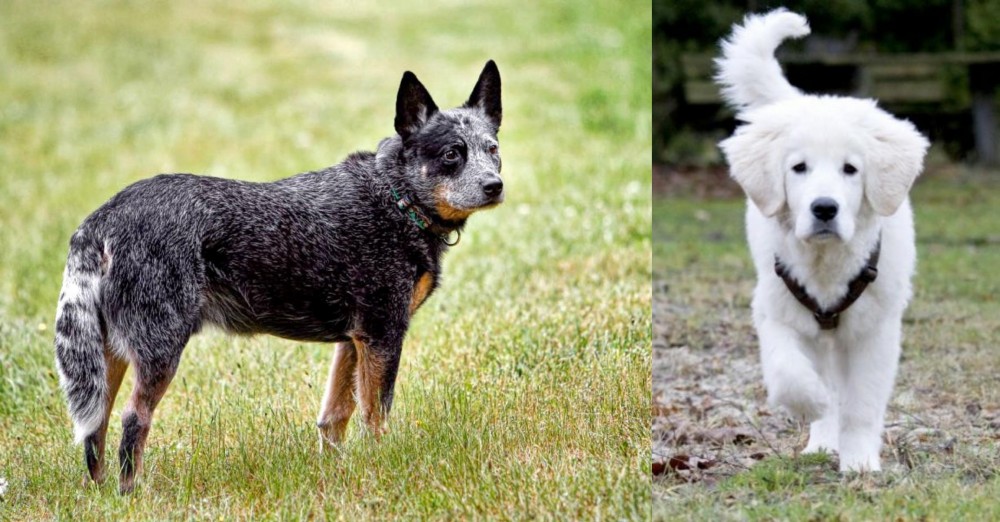 Austrailian Blue Heeler is originated from Australia but Polish Tatra Sheepdog is originated from Poland. Austrailian Blue Heeler may grow 20 cm / 7 inches shorter than Polish Tatra Sheepdog. Austrailian Blue Heeler may weigh 44 kg / 97 pounds lesser than Polish Tatra Sheepdog. Austrailian Blue Heeler may live 4 years more than Polish Tatra Sheepdog. Both Austrailian Blue Heeler and Polish Tatra Sheepdog has almost same litter size. Austrailian Blue Heeler requires High Maintenance. But Polish Tatra Sheepdog requires Moderate Maintenance
Austrailian Blue Heeler is originated from Australia but Polish Tatra Sheepdog is originated from Poland. Austrailian Blue Heeler may grow 20 cm / 7 inches shorter than Polish Tatra Sheepdog. Austrailian Blue Heeler may weigh 44 kg / 97 pounds lesser than Polish Tatra Sheepdog. Austrailian Blue Heeler may live 4 years more than Polish Tatra Sheepdog. Both Austrailian Blue Heeler and Polish Tatra Sheepdog has almost same litter size. Austrailian Blue Heeler requires High Maintenance. But Polish Tatra Sheepdog requires Moderate Maintenance
 In 1840, George Elliott made a match with Australian Dingo and Collie and got a clever and very active dog breed – Australian Blue Heeler. Soon, he showed his good herding instincts and protective nature and got really popular among the cattlemen and ranchers. Soon, as the USA soldiers arrived in Australia, they decided that it will be a great dog to bring home.
In 1840, George Elliott made a match with Australian Dingo and Collie and got a clever and very active dog breed – Australian Blue Heeler. Soon, he showed his good herding instincts and protective nature and got really popular among the cattlemen and ranchers. Soon, as the USA soldiers arrived in Australia, they decided that it will be a great dog to bring home.
Australian Blue Heeler has short, double coat. The coat is water resistant and helps them when the temperature is too high as well. Their coat is rough to the touch, naturally. They can be found in blue or red coat colour mix. The Blue Heeler isn’t actually blue, but their black coat has a bluish tint. Red Heelers have red fur instead of black. They have long tails, strong legs, Dingo-like heads with pointy ears and muscular necks and balanced and athletic bodies.
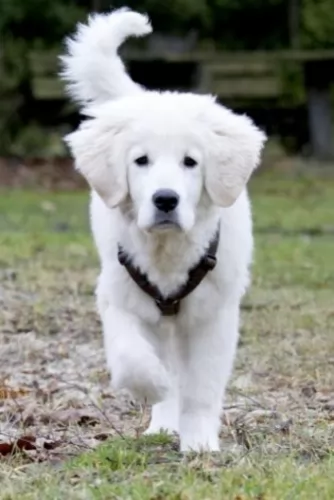 Known also as the Tatra Mountain Sheepdog, Polish Mountain Sheepdog or the Polski Owczarek, the Polish Tatra Sheepdog comes from Poland.
Known also as the Tatra Mountain Sheepdog, Polish Mountain Sheepdog or the Polski Owczarek, the Polish Tatra Sheepdog comes from Poland.
Shepherds were wanting an excellent guard dog for their livestock, and this dog has a natural instinct for guarding. Apart from being a good protection dog, the dog is also a superb companion.
This is a rare dog breed and not recognized by the AKC. This is actually an ancient breed, and the dog has lived in the Polish mountains for thousands of years. When the breed actually came about hasn’t been recorded. Some people suggest the Tatra Sheepdog comes from the Mastiff dog.
After the World Wars the dog’s number had been reduced and the Federation Cynologique Internationale started breeding the dog in the 1960s.
 This breed is somehow designed for an outdoor life and outdoor activity. This implies that Blue Heelers have nature made of the high dose of energy. They are always ready to go anywhere you go, and they will be a loyal friend. They are actually very clever, intelligent and ready to help.
This breed is somehow designed for an outdoor life and outdoor activity. This implies that Blue Heelers have nature made of the high dose of energy. They are always ready to go anywhere you go, and they will be a loyal friend. They are actually very clever, intelligent and ready to help.
If you are a type of the person who prefers being indoors and having minimal physical activity, Blue heelers are not the type of a furry companion for you. They have a high daily need for the activity, and they love having lots of space to run and explore. Sometimes, you will realize that having a leash is a must because they will get so playful that they will forget about you!
If you start teaching them to be friendly with other dogs while they are still pups, they will accept that kind of lifestyle. But, if your Blue Heeler is raised as the only dog on the ranch, note that they won’t be very friendly toward other dogs.
Since most of the herd dogs usually respond to only one person, most of the Blue Heelers can follow this old instinct. They can be very independent, as well, and they are usually not the type of the dog that will always be around your leg waiting for a cuddle or ear scratch. But, they build the respect towards humans depending on how they treat him so they can be very lovable and friendly pets.
If you are still confused about their name, you must know that the Blue Heelers can actually lightly nip your heel for attention. They are not aggressive, but they tend to be very protective of the family, humans around them and their property.
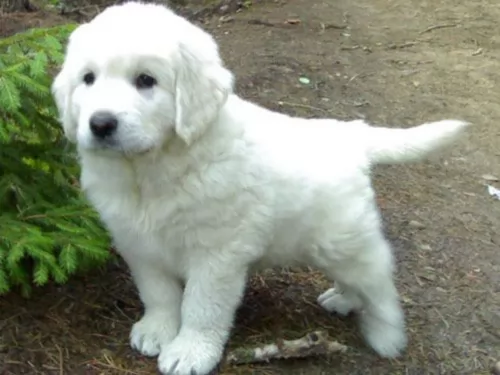 If you bring a Polish Tatra Sheepdog puppy into your home you might think you had a gorgeous Polar Pear Cub roaming around – that’s how cute they are.
If you bring a Polish Tatra Sheepdog puppy into your home you might think you had a gorgeous Polar Pear Cub roaming around – that’s how cute they are.
These are large, well built white coated dogs and the average height for them as an adult is between 60 to 70cm, male and female. Weight of the dog is between 36 and 60kg.
The double coat is medium length and thick. The ears are medium length and floppy and the tail is long and carried low when the dog is at rest, but it is carried up and over the back when the dog is alert and watchful.
These dogs have a lot of characteristics that make it such a good guardian dog. He is territorial, bold, protective, loyal and always loving towards his human family.
The Tatra has a loud bark and he uses this when he is wary of anything that he thinks may harm his family. He is an intelligent dog too, and you won’t have any trouble training and socializing him.
 They are generally good with children, but you must be aware of their inherent desire to herd. Always supervise when your Blue Heeler is around small children.
They are generally good with children, but you must be aware of their inherent desire to herd. Always supervise when your Blue Heeler is around small children.
Ball tricks, frisbee fun, running companion, herding cattle.
It is best to buy a puppy. These dogs get attached to one human and to the territory.
They are generally quick learners. If you teach them to be playful, friendly and loving, they will learn it in no time. So be aware of the decisions that can cost you when the dog grows up.
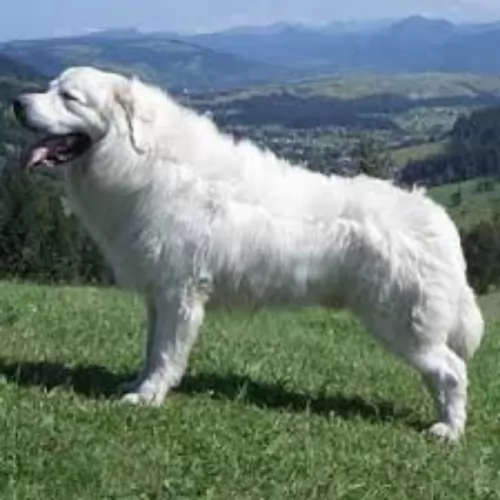 These large sheepdogs have always been guard dogs – they were bred to guard sheep and have always spent a lot of time on their own, away from humans.
These large sheepdogs have always been guard dogs – they were bred to guard sheep and have always spent a lot of time on their own, away from humans.
To many people, he may seem to be somewhat aloof and independent, but for people looking for a guard dog, this particular characteristic is particularly appealing.
Nonetheless, brought up with lots of love and care he makes the most devoted, loving pet.
 Progressive Retinal Atrophy usually causes slow and painless loss of sight. This process takes years, but there are cases where this disease took only months before the dog ended up completely blind.
It is advisable to take your Blue Heeler to the vet for a test that can tell you if your dog is carrying the gene for this disease.
Progressive Retinal Atrophy usually causes slow and painless loss of sight. This process takes years, but there are cases where this disease took only months before the dog ended up completely blind.
It is advisable to take your Blue Heeler to the vet for a test that can tell you if your dog is carrying the gene for this disease.
Lens luxation is a disease where the lens of dog’s eye separates partially or completely. Good news is that this disease can be treated.
Most common is the hip or elbow dysplasia. This is the disease where hip joints do not develop properly and begin to grind. This condition can sometimes be treated with physiotherapy, but there is a chance that your Blue Heeler will need a surgery. If you have a habit of regular vet checks and keeping your dog slim and fed with quality food, you can a make a big difference.
Osteochondritis Dissecans (OCD) causes the dog to have excess cartilage and deficient bone, where cartilage does not get replaced by bone during fetal development. This disease usually requires surgery and prescribed medicines.
Congenital hereditary sensorineural deafness – CHSD is a common form of deafness.
Bilateral deafness can be identified when the dog is still a puppy, more-less at six weeks of age. A puppy with deafness in only one ear is harder to identify, but it can happen.
Portosystemic shunt means that the blood flow is getting back into the bloodstream instead of passing through the liver. That means that liver can’t clear out the toxins, and the organ itself fails to grow properly. This inherited type of shunt can be treated with surgery if the diagnose is set on time.
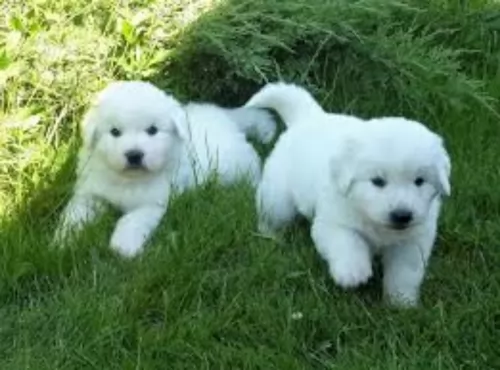 While your Polish Tatra Sheepdog isn’t likely to suffer from any major dog health issues if he is well fed, well exercised and loved, he may well succumb to one or two of some of the typical illnesses there are that plague dogs -
While your Polish Tatra Sheepdog isn’t likely to suffer from any major dog health issues if he is well fed, well exercised and loved, he may well succumb to one or two of some of the typical illnesses there are that plague dogs -
This is such a common- and serious problem with dogs, that it bears mentioning. Hip dysplasia is a problem with the hips so that the bones don’t fit- and move properly. The end result for the dog is pain, inflammation and swelling. Your dog is reluctant to play and get up again after lying down. Arthritis can set in which can also be painful. There are treatments to help with managing pain, but in some instances, surgery may be required.
Because the Polish Tatra Sheepdog is a deep chested dog, he is more prone to bloat, which is life threatening. Gas is trapped in the stomach, the stomach twists and the dog has a swollen stomach, is restless and in stress. Immediate veterinary intervention will be required.
This can be debilitating for your dog as he wants to be licking and scratching the whole time. Usually you’ll see this in the paw- and stomach area. There are a range of medications that the vet will suggest.
 Choose a dog food that will provide nutrients that will help in the bone developing. Since they are more likely to suffer from joint diseases, you must take this advice seriously. It would be great if you speak about this with your vet before you choose food on your own.
Choose a dog food that will provide nutrients that will help in the bone developing. Since they are more likely to suffer from joint diseases, you must take this advice seriously. It would be great if you speak about this with your vet before you choose food on your own.
The best food for Blue Heeler is a high-quality food which supplies them with premium nutrition to fuel their activity.
They also drink a lot of water, so be sure that they always have a fresh water available.
Lots and lots of the outdoor activity and a quality food. You must be very cautious because this kind of dogs gets overweight easily because they just love the treats and extra food portion.
Any outdoor activity that is mentally challenging and interesting enough to keep them from running in the field trying to catch anything that moves.
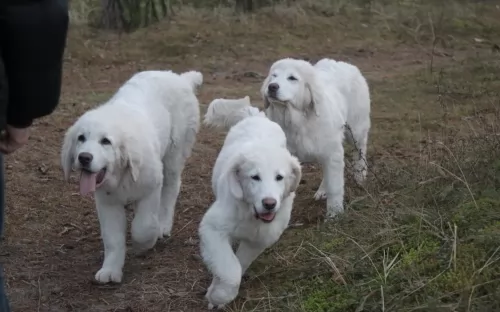 The Polish Tatra Sheepdog is an energetic dog and this means he will require a large sized garden to run around in. As a large, active dog he isn’t recommended for city living but would suit a large property where he can be well exercised. Because of its size and energy levels, regular walks will be recommended. Provide the dog with stimulating games that will be mentally and physically beneficial.
The Polish Tatra Sheepdog is an energetic dog and this means he will require a large sized garden to run around in. As a large, active dog he isn’t recommended for city living but would suit a large property where he can be well exercised. Because of its size and energy levels, regular walks will be recommended. Provide the dog with stimulating games that will be mentally and physically beneficial.
This large dog sheds, and seasonally too, so he will need to be brushed at least twice a week to prevent loose hair.
Check inside your dog’s ears for infection.
Trim your dog’s nails.
Check your dog for fleas and ticks and check him over for any unusual lumps.
Every pet lover wants their dog to live a long, healthy, active life. That is why it is so important to choose the best dog food.
If you buy commercially manufactured dog food, make sure its the high quality ones to ensure its properly formulated to provide your pet with all the vitamins and minerals he needs.
Home-made food is also an excellent choice for your pet. Boiled chicken, brown rice or pasta and spinach, sweet potatoes and carrots can be very healthy, and you can chop this up and add it into the dry kibble a couple of times a week. This is a super tasty treat. Some raw meat added in occasionally will do him the world of good.
Never leave your pet without a constant source of fresh, cool water.